About Easy IP™
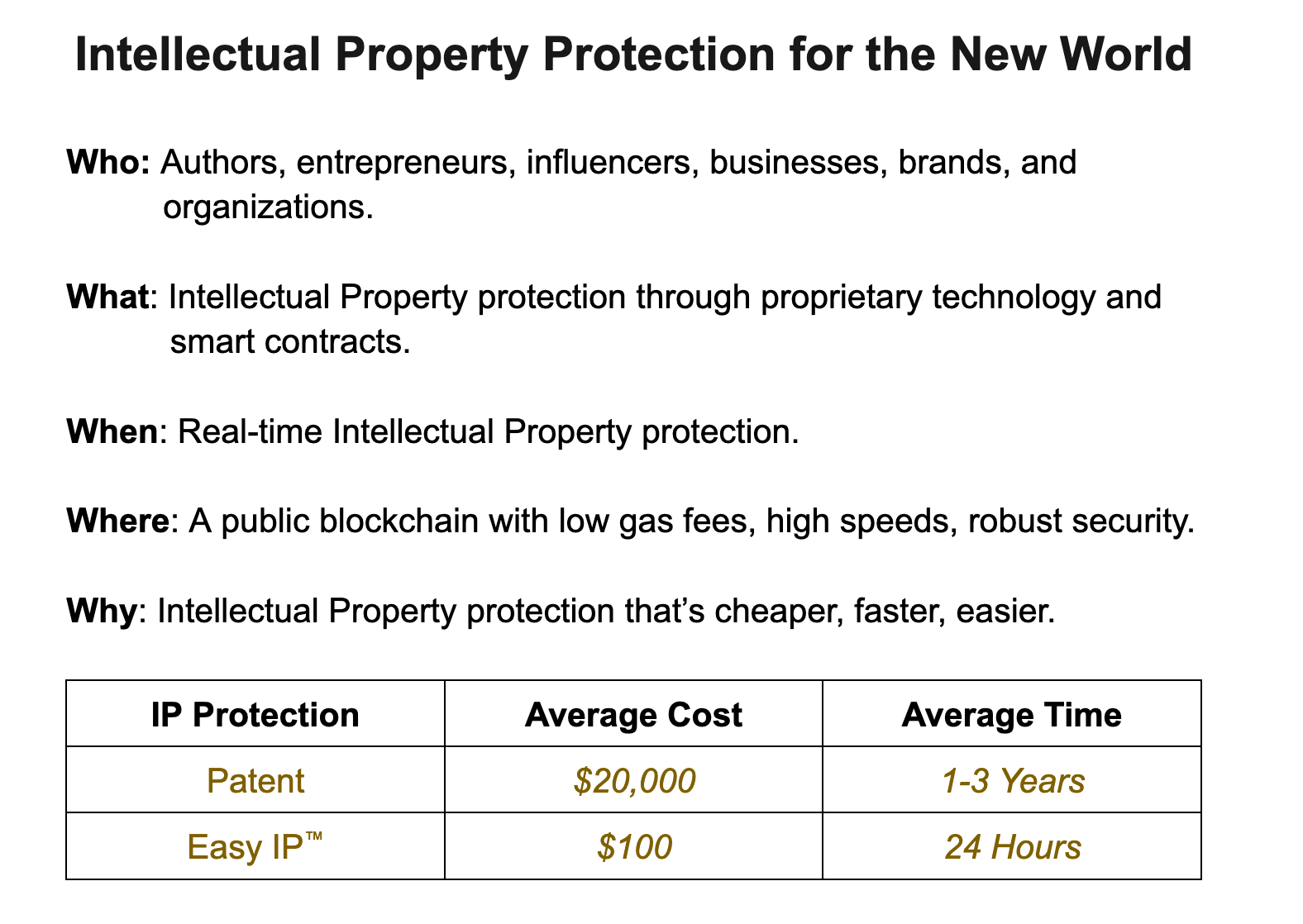
Our Founder’s remarks to Congress Commissioned USPTO Panel on Intellectual Property and Easy IP™
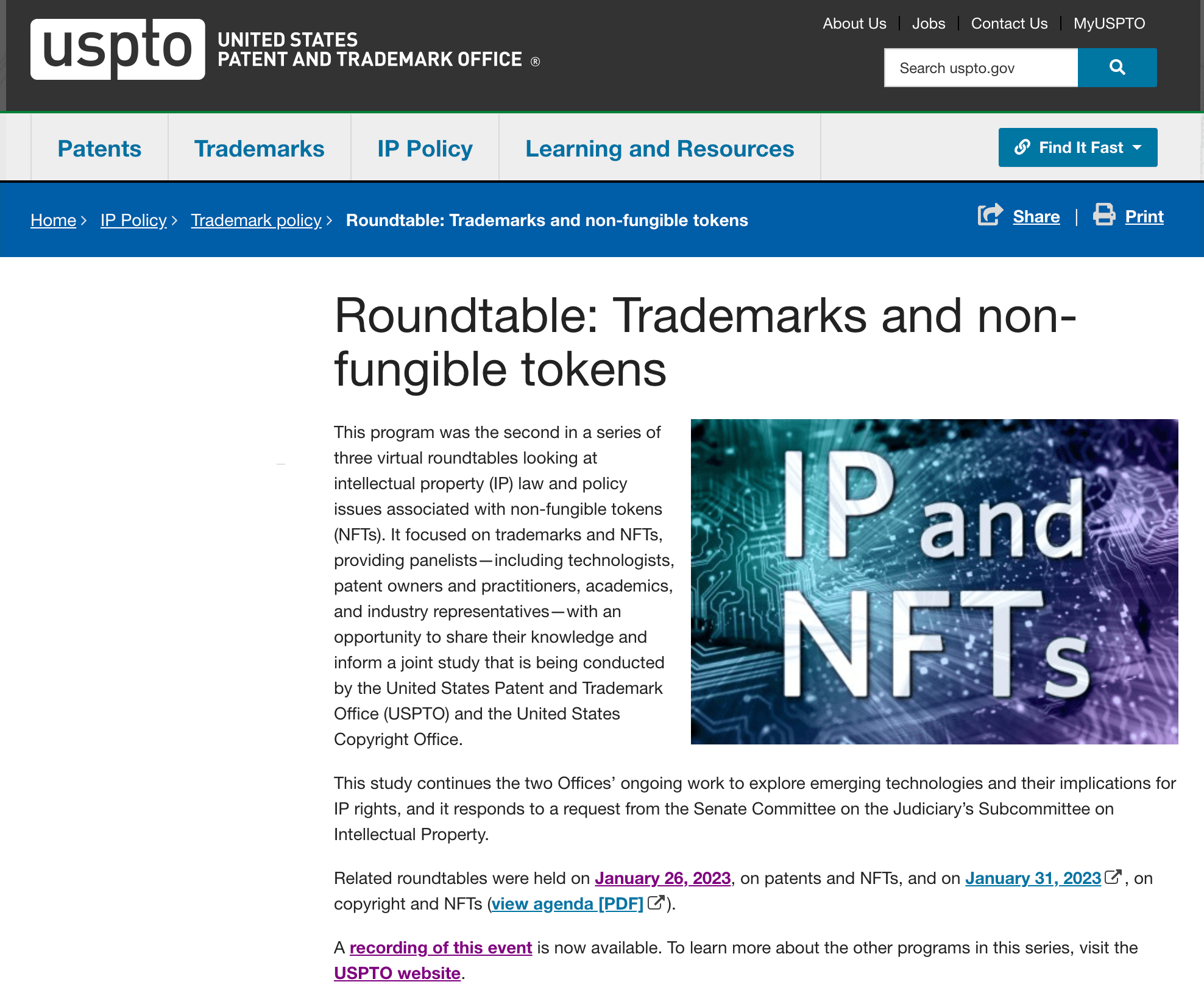
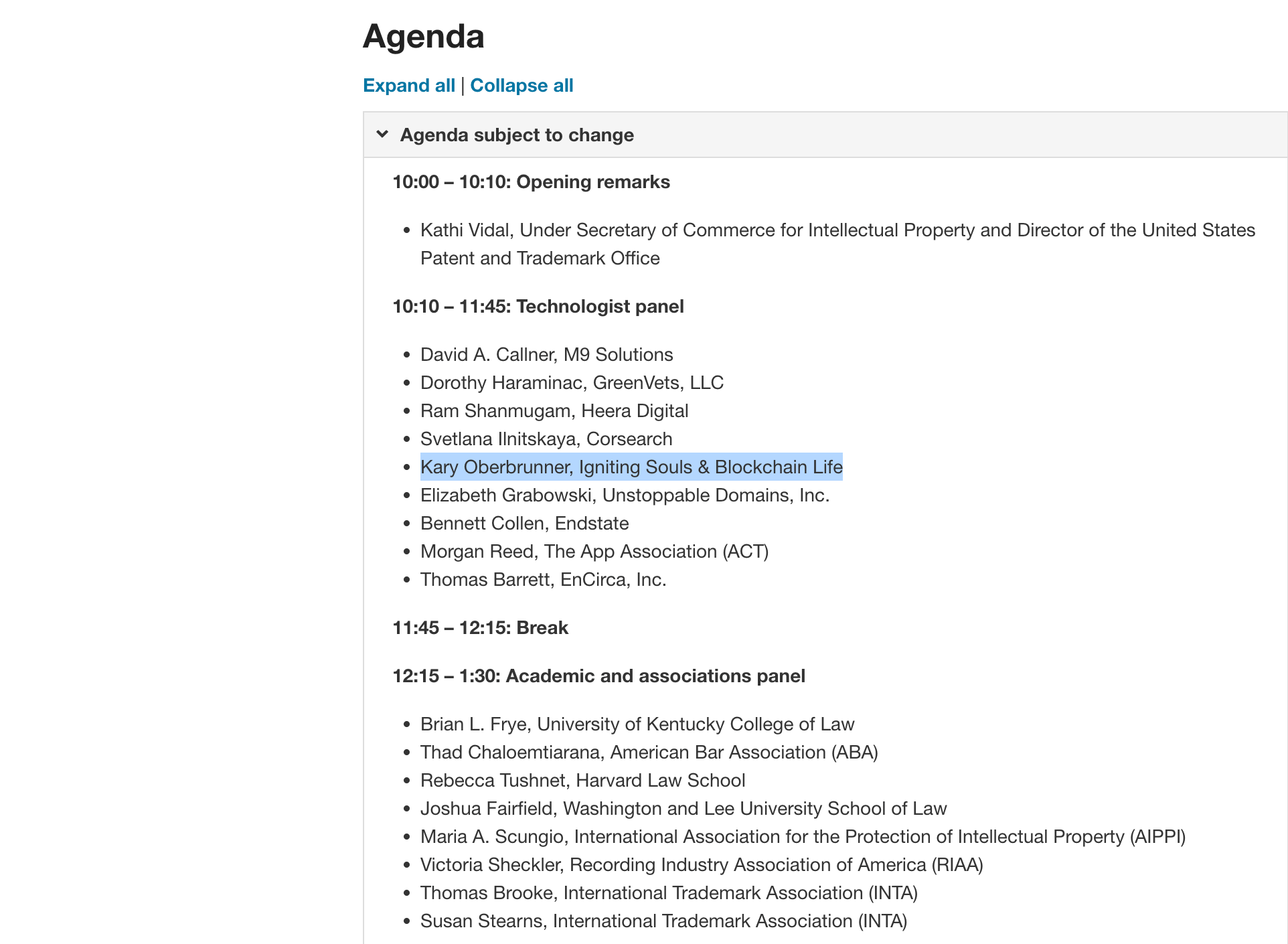
Patents versus Easy IP™
Which to use, When, and Why?
Kary Oberbrunner’s exclusive interview with Katie Rubino, Chair of Life Sciences Practice Group at Caldwell Intellectual Property Law, the fastest growing IP Law Firm in the USA. They discuss patents and Easy IP™ and when it makes sense to use each to protect your intellectual property.
Is your Intellectual Property Protected?
The Digital Age favors a Creator Economy. This means the most value related to your books, businesses, and brands is your Intellectual Property.
Since 1975 we’ve experienced a massive shift within the S&P 500* from tangible assets to intangible assets. (More on this shift depicted in the image below.)
In 2020, 90% of assets in the S&P 500 were intangible assets. This trend is only increasing as time goes on.
*The Standard and Poor’s 500, or simply the S&P 500, is a stock market index tracking the stock performance of 500 large companies listed on exchanges in the United States. It is one of the most commonly followed equity indices.

Patents have their Place
Patents provide protection and they make sense in certain cases like when you want to take infringers to court, borrow money against your patent portfolio, or increase valuation when you sell your company.* (Sue. Borrow. Sell.)
*Easy IP™ is patent-pending. Why? Because, someday we might sell the company. Our CEO and founder Kary Oberbrunner uses Easy IP™ to protect all of his other Intellectual Property.
But patents are expensive (average $20,000) and take a long time (average 3 years). According to the USPTO patents have a first-time rejection rate of more than 85%. As a result, patents often prove to be costly in terms of time and money.
*Michael Carley, Deepak Hegde, and Alan Marco, “What is the Probability of Receiving a U.S. Patent”, 17 Yale J.L. & Tech. 203 (2015).

Easy IP™ is the IP Protection for the New World
We’re quickly moving into Web3, the “new version of the Internet.” By leveraging blockchain technology and smart contracts we’ve developed a patent-pending proprietary process that protects your Intellectual Property cheaper, faster, easier. (More on Web3 depicted in the image below)
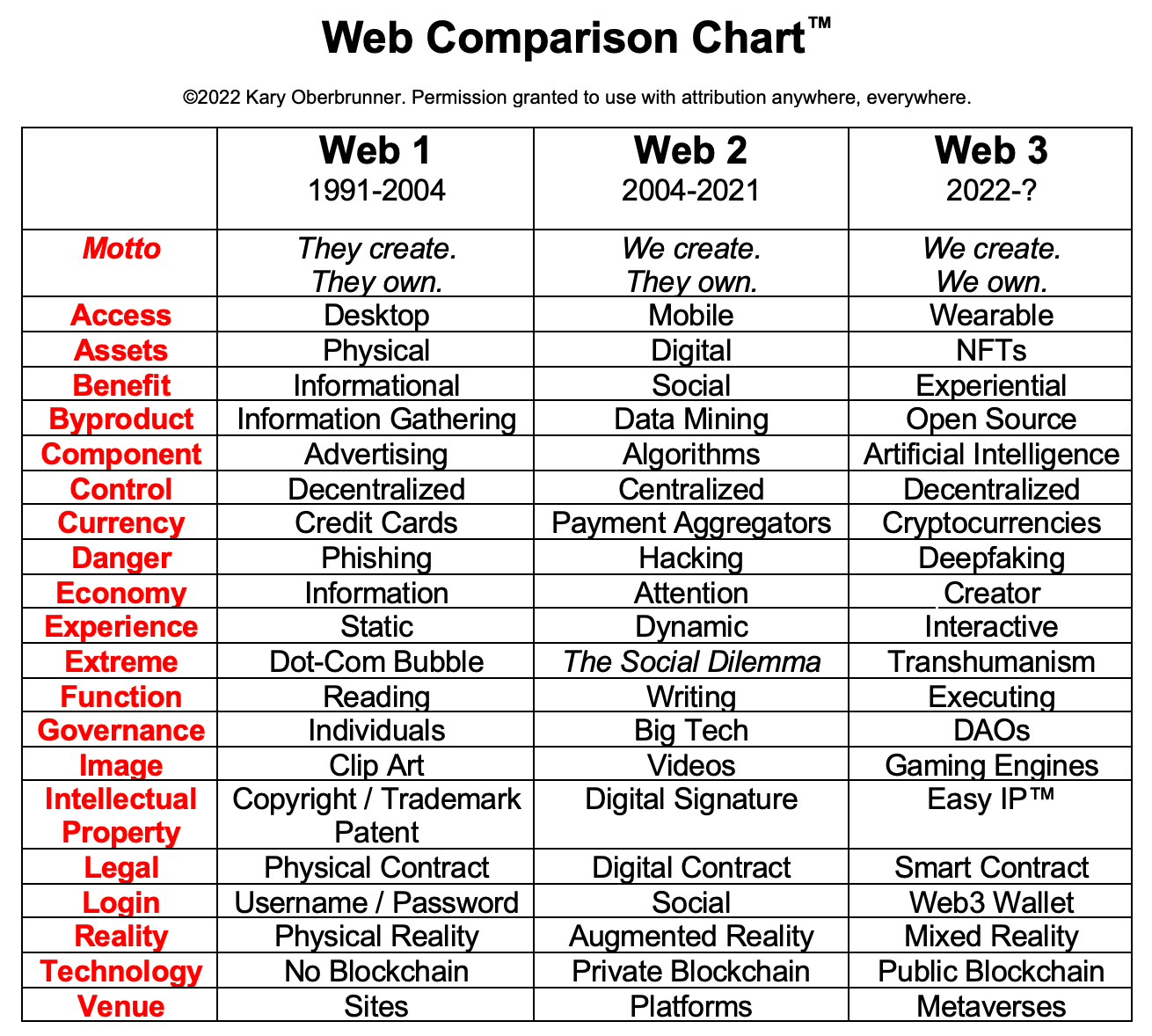
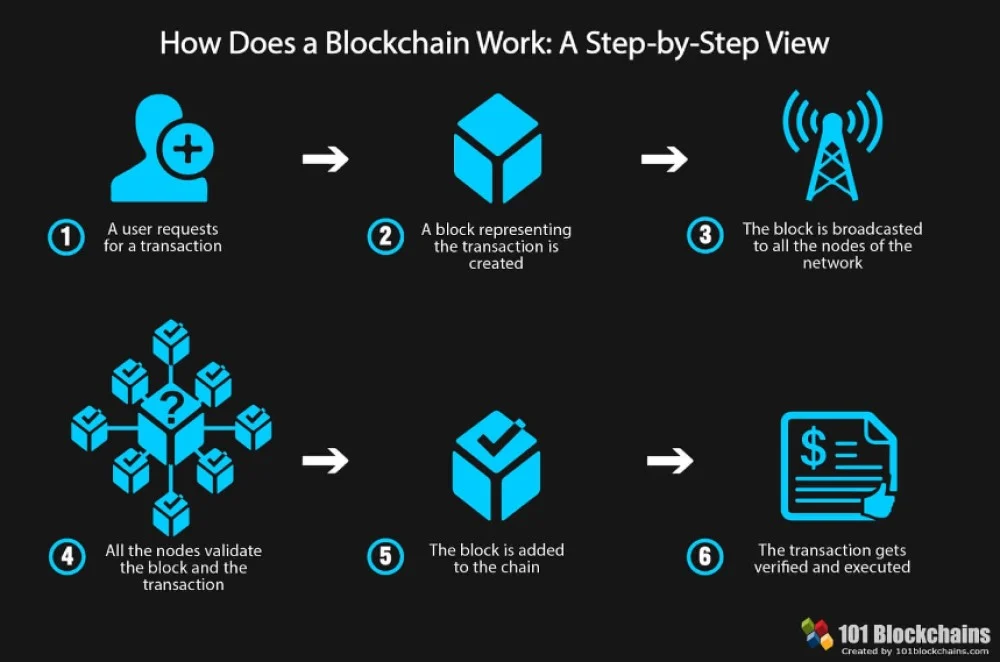
The Need to Prove “First Use”
The USPTO has much to say about “First Use” in respect to Intellectual Property.
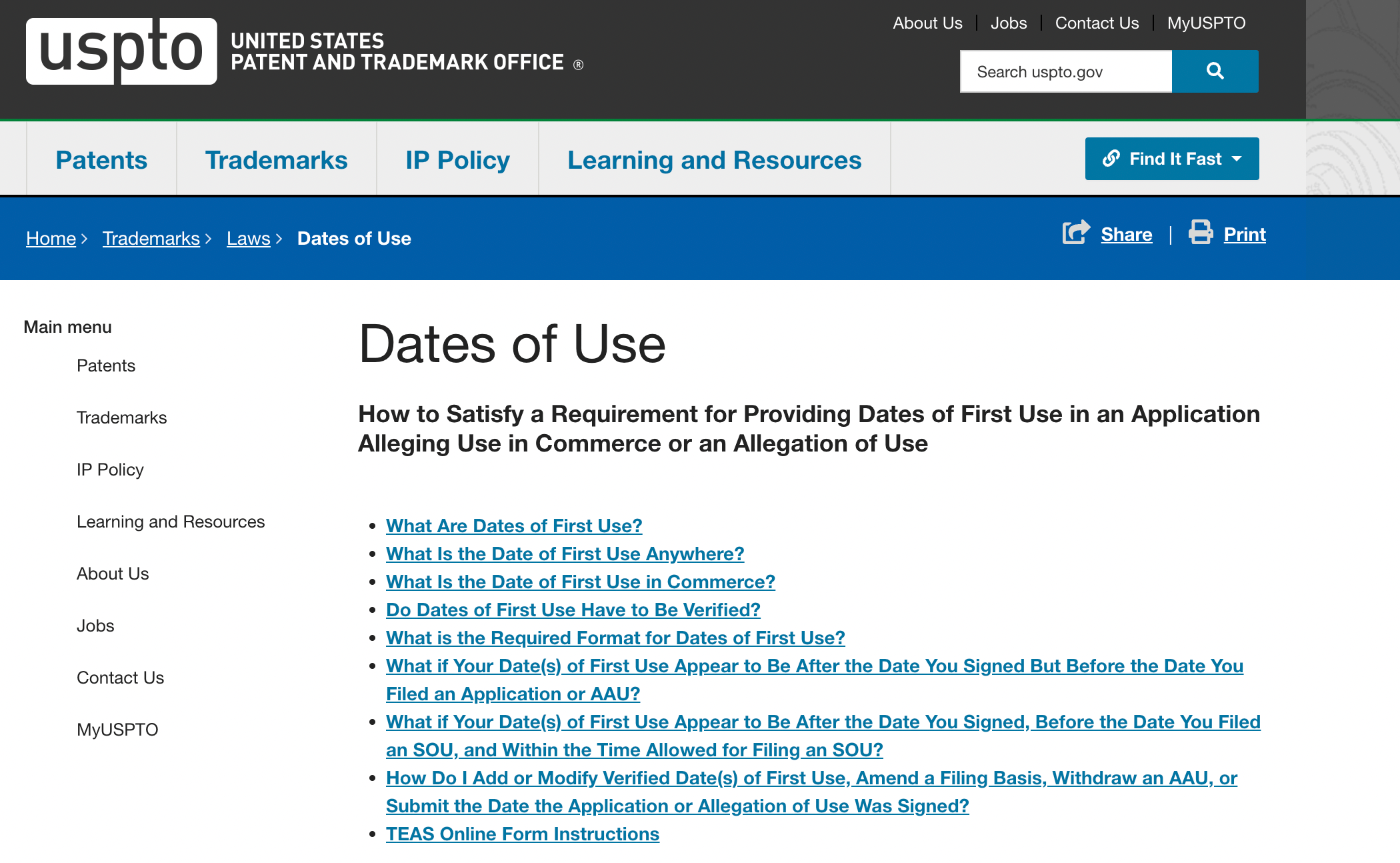
According to the USPTO, the applicant must provide documentation of “First Use.”
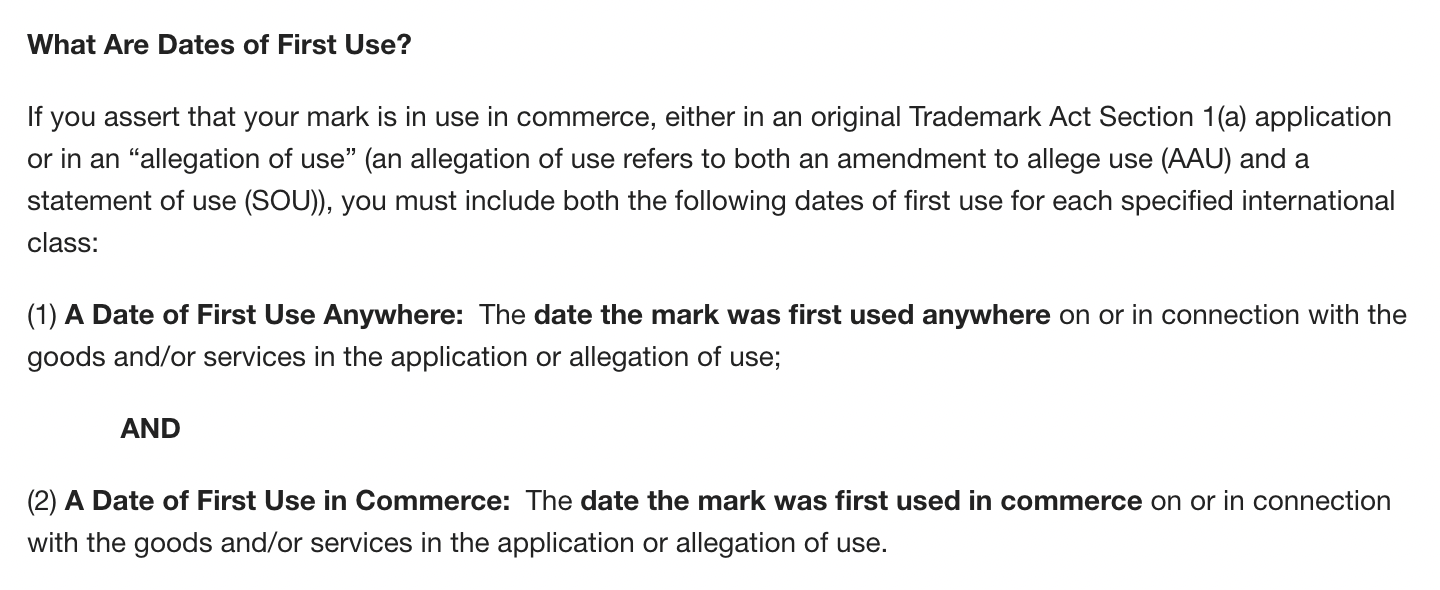
Smart Contracts are Superior
Through our proprietary patent-pending process, Easy IP™ integrates blockchain technology giving your Intellectual Property “global protection.” By creating a “time-stamped” smart contract that can never be tampered with or changed, we establish “First Use” that tracks back to you, the owner.
Smart contracts are superior because they’re immutable and unchanging. This means bad actors cannot change the “time stamp” (First Use) because it’s permanently captured on the blockchain.
NOTE: We only protect your Intellectual Property. If you submit Intellectual Property that you do not own, you will be legally responsible.
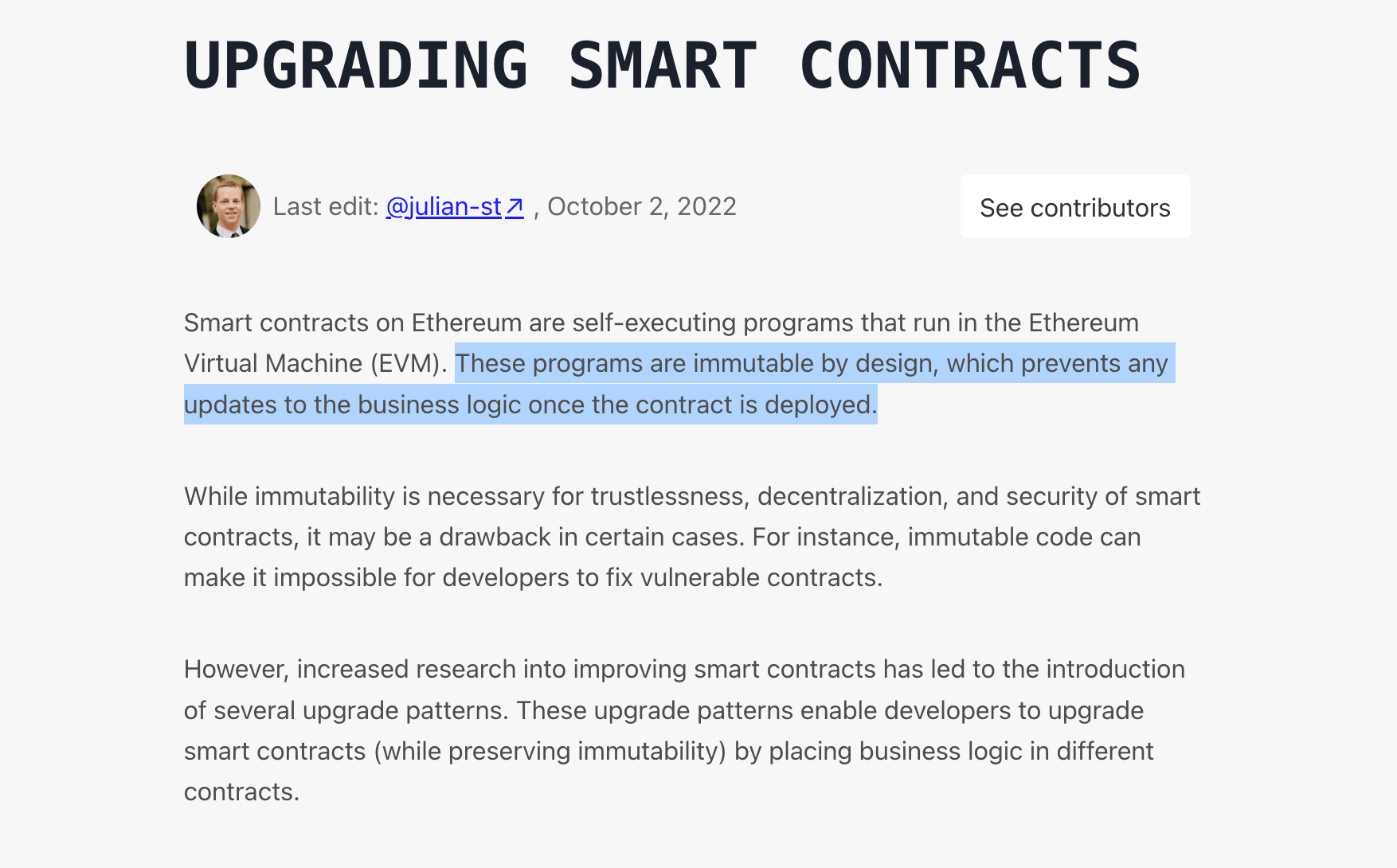
Smart Contracts are Recognized Worldwide
Smart contracts are the way of the future. Currently states and countries recognize this technology and favor it because of the many benefits listed below. Experts believe soon all transactions will be done via smart contracts. (Example include: marriage licenses, real estate deeds, vehicle titles, academic diplomas, business agreements, etc.)
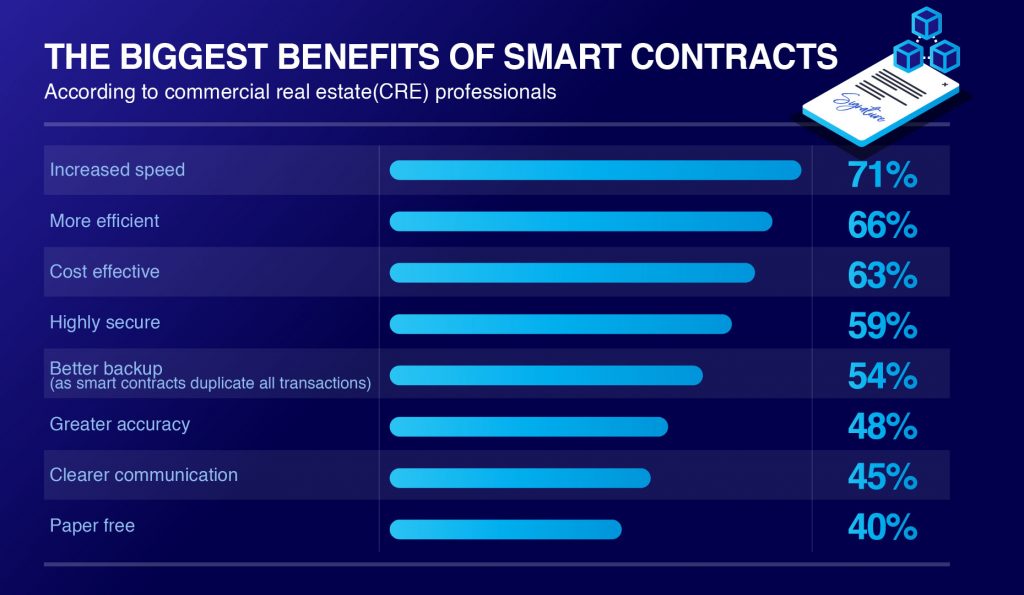
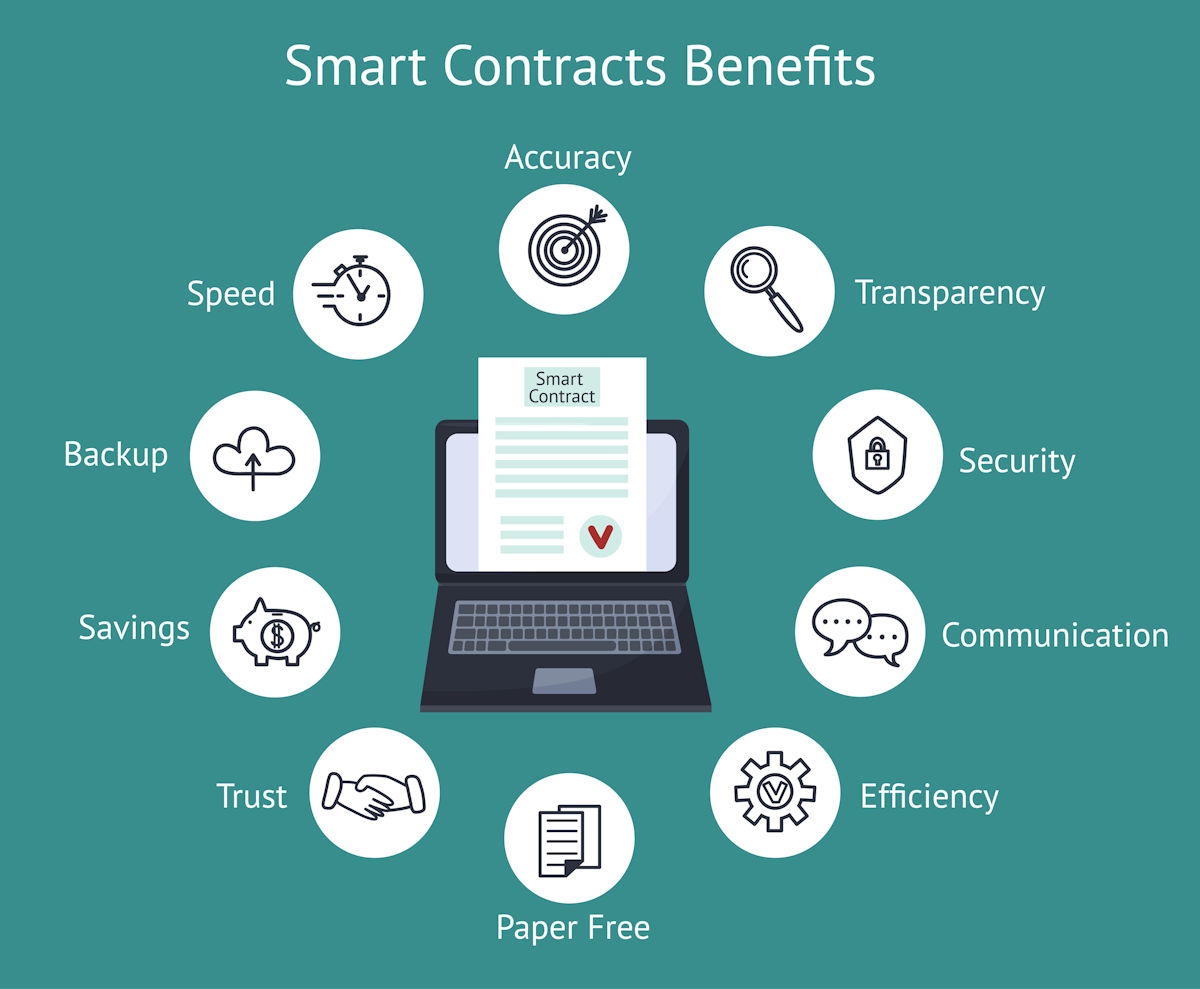
Meet the Team behind Easy IP™
Intellectual Property Protection for the New World

KARY OBERBRUNNER is a Wall Street Journal and USA Today bestselling author of more than a dozen books. As CEO of Igniting Souls and Blockchain Life, he helps authors, entrepreneurs, and influencers publish, protect, and promote their Intellectual Property and turn it into 18 streams of income. His companies are committed to: Setting Free World-Changing Ideas. An award-winning novelist, screenwriter, and inventor, he’s been featured in Entrepreneur, CBS, Fox News, Yahoo, and many other major media outlets.
As a young man, he suffered from severe stuttering, depression, and self-injury. Today a transformed man, Kary ignites souls. He speaks internationally on a variety of topics including leadership, personal growth, human performance, blockchain technology, and entrepreneurship. As a futurist, he often consults on marketing, branding, Intellectual Property, and Web3.
He has several earned degrees, including a Bachelor of Arts, Masters in Divinity, and Doctorate in Transformational Leadership. He also serves as the Berry Chair of Entrepreneurship at Cedarville University, where he teaches on the topics of Entrepreneurship and Digital Marketing. Kary enjoys cycling, especially in the French Alps. He lives in Ohio with his wife Kelly and three children: Keegan, Isabel, and Addison.
Sarah Grandstaff is currently the Integrator for Easy IP™ and Igniting Souls. Sarah is a publishing Veteran, Author, and Team Leader. She is the author of Unhackable Teams. In addition to being a coach focused on maximizing teamwork and leveraging UniqueAbilities, Sarah is also a consultant on organizational efficiencies.

Frequently Asked Questions
1. What is a smart contract?
A smart contract is a computer program or a transaction protocol that is intended to automatically execute, control or document events and actions according to the terms of a contract or an agreement.
Röscheisen, Martin; Baldonado, Michelle; Chang, Kevin; Gravano, Luis; Ketchpel, Steven; Paepcke, Andreas (1998). “The Stanford InfoBus and its service layers: Augmenting the internet with higher-level information management protocols”. Digital Libraries in Computer Science: The MeDoc Approach. Lecture Notes in Computer Science. Springer. 1392: 213–230. doi:10.1007/bfb0052526. ISBN 978-3-540-64493-4.
Fries, Martin; P. Paal, Boris (2019). Smart Contracts (in German). Mohr Siebeck. ISBN 978-3-16-156911-1. JSTOR j.ctvn96h9r.
Savelyev, Alexander (14 December 2016). “Contract Law 2.0: “Smart” Contracts As the Beginning of the End of Classic Contract Law”. Social Science Research Network. SSRN 2885241.
Tapscott, Don; Tapscott, Alex (May 2016). The Blockchain Revolution: How the Technology Behind Bitcoin is Changing Money, Business, and the World. Portfolio/Penguin. pp. 72, 83, 101, 127. ISBN 978-0670069972.
2. Can smart contracts be changed?
When the smart contract is executed, the software protocol creates an immutable (unchangeable) record of the transaction, linking it to the block of prior transactions in that blockchain. The cryptographic links between each block make it virtually impossible to go back and edit or delete prior transaction data.
Bench, Jonathan. Are Smart Contracts Legal Contracts? April 26, 2023. https://harrisbricken.com/blog/are-smart-contracts-legal-contracts/
3. Are smart contracts legally binding and enforceable in the United States?
Several states have passed or have pending legislation related to smart contracts, ranging from forming exploratory committees to recognizing basic concepts to providing comprehensive treatment.
For example, Illinois passed the Blockchain Technology Act in January 2020, which defines smart contracts and provides that they are valid and enforceable if they meet certain requirements. New York has a bill that simply recognizes the use of blockchain technology and smart contracts in commerce.
There is also a strong argument to be made that existing contract, electronic signature, and related laws and regulations are already adequate to manage the legal implications of smart contracts.
The Arizona governor has signed a bill that officially recognizes blockchain signatures and smart contracts. According to the bill, it states that ‘a record or contract that is secured through blockchain technology is considered to be in an electronic form and to be an electronic record.’
It further adds that: “Smart contracts may exist in commerce. A contract relating to a transaction may not be denied legal effect, validity or enforceability solely because that contract contains a smart contract term.”
Morris, Manning & Martin. Smart Contracts And U.S. State Law. April 5, 2023.
Campbell, Rebecca. Official: Arizona Law Recognizes Blockchain Signatures and Smart Contracts, March 4, 2021.
4. Are smart contracts legally binding and enforceable in other countries?
Many countries have incorporated smart contracts into their laws, including Italy and Dubai. Belarus was the first country to legalize smart contracts in 2017.
Smart contracts are computerized transaction protocols that execute contract conditions. They are similar to existing contracts because they have the same goals.
Smart contracts are enforceable as long as they follow the basic rules of contractual agreements.
John, Fáwọlé . Smart Contract Use Cases: Unlocking Blockchain’s Potential. April 19, 2023.
5. If I need to make updates to my Easy IP™ smart contract, what do I do?
Businesses and brands often modify their Intellectual Property over time. Logos evolve and processes are refined. (See KFC example below.) Because smart contracts are immutable you can’t change them. Rather, you want to add another smart contract.
It’s important for you to demonstrate the evolution of your Intellectual Property. (Also like the example below.) Easy IP™ is your simple solution to make this a reality.

